Law
CLO urges Tinubu to direct AGF Fagbemi to pay Niger State community N1.1trn as damages

The Civil Liberties Organization (CLO) on Monday appealed to President Bola Tinubu to direct the Attorney General of the Federation and Minister of Justice, Lateef Fagbemi SAN to without delay comply with a court order that awarded the sum of N1.1trillion to a community in Niger State over damages caused by overflow of Zungeru Dam.
Mr. Ibuchukwu Ezike, executive director of CLO, made the call at a press conference in Abuja.
Ezike said the sum represents cost of damages awarded to
Samboro Community which was “forcefully displaced and their livelihoods destroyed due to the construction of the Zungeru Hydro-electric Power Dam in the state.”
According to him, the press conference was meant to “draw local and international attention to the prevailing plight of the inhabitants of Samboro Community in Madaka District, Rafi Local Government Area of Niger State who were forcefully ejected and displaced from their communal land due to the poor design and construction of the Zungeru Hydro-electric Power Dam in the state by the Federal Government of Nigeria, through the Federal Ministry of Mines and Power.”
He explained that: “Trouble started for the hapless Samboro Community when Zungeru Hydro-Electric Dam overflowed and released unimaginable volume of water into the community and within hours and days, washed away the livelihood and homes of the inhabitants.
“As the devastating effects of the Dam raged, our sources informed us that the Federal Government of Nigeria neglected/failed to come to the aid of its own people who were left to survive on their own.
“Dissatisfied with the government’s behaviour, Alhaji Abubakar Usman, the village head of Samboro Community and 2,844 other community members on April 27, 2023, filed a complaint with the court in case number NSHC/ Kut/6/2023.
“The Samboro Community Lawyer, Muhammed Ndarani Mohammed, Senior Advocate of Nigeria, SAN, who filed the suit challenged the government on the damaging impact of the Dam on the community and demanded compensation.
“Justice Mohammed Adishetu Mohammed of High Court 4 in Minna, Niger State after hearing all the parties ordered the Federal Ministry of Mines and Power to pay N1.1 trillion as compensation for damages caused to the affected Samboro Community.”
He added: “While the CLO notes that the Federal Ministry of Mines and Power has been cited as the main culprit, we are concerned that there may be surreptitious actions by the Federal Government to delay or deny the affected community the benefit of the Court judgement.
“The Civil Liberties Organisation hereby appeal to President Bola Ahmed Tinubu to uphold the rule of law as a critical component of democracy by directing the Minister of Justice and Attorney General of the Federation to ensure full compliance with the court judgement without further delay.
“We caution the Nigerian state that a stitch in time saves nine.”
Crime
Lawmakers, EFCC challenges public officials on anti-corruption
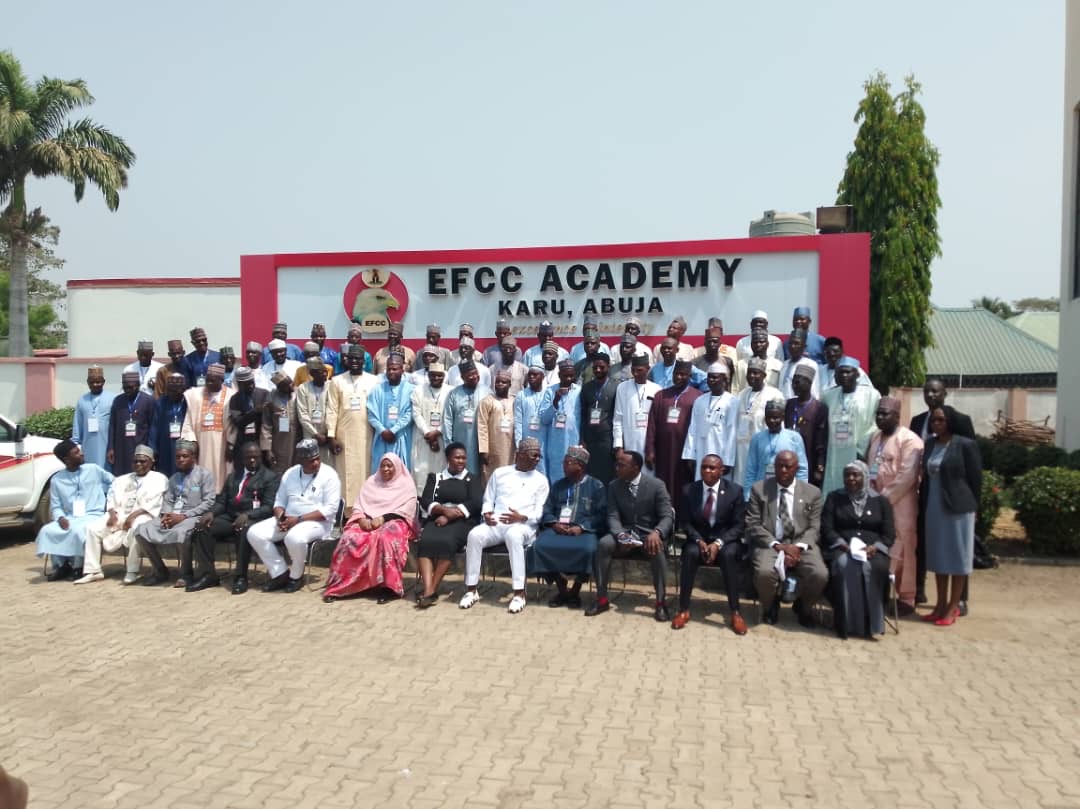
From Adeko Ukpa, Abuja
The Chairman of the House of Representatives Committee on Financial Crimes, Hon. Ginger Onwusibe and the Executive Chairman of the Economic and Financial Crimes Commission (EFCC), Ola Olukoyede, have warned public officers in the country to shun corruption.
Hon Onwusibe and Olukoyede made the call in their separate speeches during the opening session of a three-day workshop on: “Fiscal Responsibility and Transparency” organised by the House of Representatives’ Committee on Financial Crimes in collaboration with the EFCC in Abuja.
The workshop which was facilitated by Barclays Global Consult Nigeria Limited, was attended by over 100 state and local government officials from Jigawa State.
Hon. Onwusibe who was represented at the event by the Acting Clerk to the House of Representatives Committee on Financial Crimes, Austen Tolu Adesoro, noted that the country has been battling public sector corruption, money laundering, illicit financial flows, and various types of fraud for some decades, despite the current legal and institutional measures in place.
He encouraged state governments to domesticate and implement statutory laws against financial crimes as well as sensitise staff, citizens and stakeholders at all levels to promote ethical reorientation and change societal tolerance for corrupt practices.
He added that the promotion of ethical whistleblowing and respect for public funds and property must be intensified, while personal responsibility and professionalism should be encouraged and rewarded to stimulate staff commitment to work.
In an interview with reporters on the sidelines of the session, Onwusibe, through the Clerk of the Committee, Adesoro, said: “The objective of this training is to equip state and local government officials with the do’s and don’ts that will help save us all from the hydra-headed monster of corruption in the country.
“The 10th House of Representatives under the Speaker, Rt. Honourable Tajudeen Abbas, through the House Committee on Financial Crimes, apart from the oversight function of overseeing agencies, we believe in going an extra mile in the fight against corruption, which one institution cannot effectively do. We believe that fighting corruption should be a joint task.
“It is on this note that we are also working in line with the Chairman of EFCC, Ola Olukoyede, in applying more preventive measures. We don’t want to limit ourselves to exposing and prosecuting offenders alone, we want to apply preventive measures.
“It is part of this preventive measure that has geared the committee to this approach of organising seminars for government officials at the state level.
“We are not also stopping there, permit me to use this opportunity to mention that we are also looking forward to amending the EFCC Act in order to give more powers, to ensure that the EFCC Act is completely embedded in the Nigerian constitution in order to make it more effective.”
The Chairman of the EFCC, Olukoyede, who was represented at the workshop by the Acting Commandant of the EFCC Academy, Karu, Abuja, Chinwe Ndubueze, noted that fiscal responsibility is at the heart of accountable governance and efficient public service delivery.
He said: “You will all agree with me that 70 per cent of the problem that Nigeria faces in the public sector is down to poor fiscal transparency. In every budget cycle trillions of Naira are appropriated to cater to the nation’s pressing infrastructural, social and economic needs.
“Were these resources applied in accordance with laid down rules, Nigeria’s fortune would be different today. Instead, we have had the terrible fortune of rules being circumvented and funds diverted or out rightly stolen through various sharp practices in the procurement value chain, while the rest of us suffer the consequence of the indiscretion of a few corrupt public officers.
“We cannot continue to play the game of ostrich, pretending to be interested in accountable governance while perpetuating practices that undermine accountability.
“Let me remind you all that as public officers, you occupy a vantage position to determine the fortune of this nation. Nigeria with all its human and natural resources has no business being poor.
“Corruption is the albatross that has held this nation captive. The current generation of public servants have a duty to shake off the decadent past and help Nigeria achieve her dream as a great and prosperous nation. We can only achieve this if we shun corruption in all forms.”
In her remarks, the Chief Executive Officer of the Nigerian Financial Intelligence Unit (NFIU), Hajiya Hafsat Abubakar Bakari, represented by the Director of legal Services of the agency, Barr Kingsley Amaku, described the training as timely and necessary intervention, “particularly at a time when financial integrity and accountability must be at the forefront of governance at both federal and state and local government levels.
“The fight against corruption requires not just enforcement but also a well-informed public sector that understands the legal and institutional frameworks designed to promote transparency.
“Bridging the knowledge gap in the provisions of our laws is essential to curbing corrupt practices, and this workshop serves as a crucial step in equipping you our government officials with the tools needed to uphold accountability in the public service at all levels.”
The Chief Executive Officer of Barclays Global Consult, Nigeria Limited who is the immediate past Speaker of the Kogi State House of Assembly, Rt. Honourable Matthew Kolawole, said the programme was meant to educate government officials at all levels on how to manage finances and funds that are coming to their state.
“You understand that a lot of money is going to the state and local governments, but most local governments’ officials are just newly elected. They are not acquainted with the laws that guide the utilisation of their finances,” Kolawole said.
The Chairman of the Association of Local Governments of Nigeria (ALGON), in Jigawa State, Hon. Abdulraman Lawal, and the Director of Local Governments in Jigawa State, Ismail Yusuf, in their separate remarks, said they expect to be better equipped with the necessary knowledge on how to apply and manage local and state government finances in line with extant laws and financial regulations after the training.
“Our expectation for this training is that we will go home better than the way we arrived because we are before the experts to lighten us and show us the nitty-gritty on how we can be more careful in way and manner we manage our finances in our individual local governments,’ Lawal said.
On his part, the Jigawa State Director of Local Governments, Ismail Yusuf, said: “Our expectation is that, we have newly elected local government chairmen and there is need for us to give them a capacity building on how to carry out their jobs so as to avoid any kind of financial mismanagement and be excellent leaders that will carry and manage the public funds in a proper manner.”
Other heads of anti-corruption agencies who were present at the opening session of the workshop, included the Chairman of the Code of Conduct Bureau, Dr Usman Bello Abdullahi, who was represented by a member of the board of the agency, Juwariya Badamasi, Chairman of the Independent Corrupt Practices and Other related offences Commission, Dr. Musa Adamu Aliyu, represented by Hassan Salihu.
Law
Timi Frank gives FG 48 hour ultimatum to release Farotimi

By Adeko Ukpa
Former Deputy National Publicity Secretary of the All Progressives Congress (APC), Comrade Timi Frank, on Thursday, gave the Federal and Ekiti State Government 48 hours to release a human rights lawyer, Dr. Dele Farotimi from remand or face mass protests.
Frank who made this call in a statement in reaction to the remand of Farotimi, called on Nigerians to occupy all police stations and formations in the country should the government fail to release the rights activist unconstitutionally within the stipulated time beginning from when he was remanded.
An Ekiti State Chief Magistrates Court, Ado Ekiti Division, had on Wednesday, ordered the remand of Farotimi, in the state’s correctional centre.
Farotimi was arraigned in court over alleged defamation of character following his book, ‘Nigeria and its Criminal Justice System’ where he alleged, among others, that a Senior Advocate of Nigeria, Afe Babalola, had compromised the Supreme Court.
However, Frank said there is more to the arrest and remand of Farotimi than the alleged defamation alibi.
He said the remand was a way by the Federal Government to intimidate and harass Farotimi for often criticising the anti-people policies of the President Bola Tinubu’s administration.
He condemned the arrest and remand of Farotimi even as he condemned the police and the judiciary for turning themselves into the oppressive arm of the present administration.
According to him Farotimi doesn’t deserve his current travails because he is a man who believes in and respects the rule of law.
Frank said: “Farotimi is a man of truth, a man of principle and a defender of democracy. If they believe he has done anything inappropriate, they should have invited him peacefully and he honour their invitation rather than the way he was arrested and subsequently remanded on an alleged offence that is bailable under the Nigerian law.
“This shows clearly that it is not because of the petition from Afe Babalola that is making them to give Farotimi this highly dehumanizing experience. There is more to the arrest because Farotimi is known to be a vocal critic of the government.”
Frank, who is the United Liberation Movement for West Papua (ULMWP) Ambassador to East Africa and the Middle East, called on Nigerians to join in the fight to free Farotimi from remand and equally stop the government from using state institutions to oppress and suppress Nigerians speaking out against their dictatorial and hardship-inducing policies, saying, “it is Farotimi today, it may be another Nigerian tomorrow.”
He quoted a German Pastor Martin Niemöller who said: “First they came for the socialists, and I did not speak out because I was not a socialist. Then they came for the trade unionists, and I did not speak out because I was not a trade unionist. Then they came for the Jews, and I did not speak out because I was not a Jew.
Then they came for me and there was no one left to speak for me.”
Law
The Rule of Law in a Democratic Setting: A Cornerstone of Liberty and Justice for All
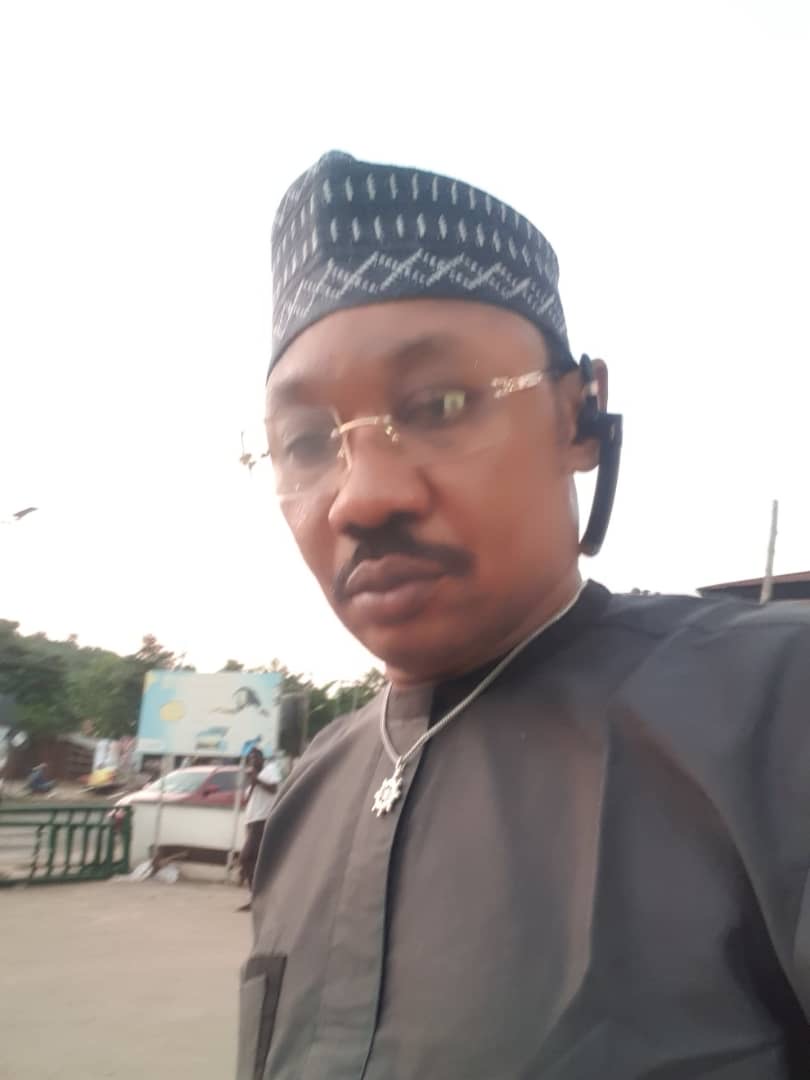
From Sir Edwin Igoche
Democracy and the rule of law are intertwined concepts that form the bedrock of a healthy and functioning society. The rule of law is a fundamental principle that ensures that all individuals, institutions, and government officials are subjected to the law, guaranteeing equal protection and justice for all.
In a democratic setting, the rule of law is essential for promoting accountability, transparency and good governance. It is a system of governance where all individuals, institutions and government officials are subjected to a set of laws that are enforced by an impartial and independent judiciary. It implies that, the law is supreme, and everyone is equal before the law without fear or favor.
The rule of law is effective and characterized by key principles in a democratic setting among which are:
• Separation of power: A system of check and balances among the legislative and judicial branches to prevent abuse of power.
• Independent and impartial judiciary: An impartial and independent judiciary to interpret the law and ensure its enforcement.
• Due process: Fair and transparent legal procedures to ensure justice and protect individual rights.
• Equality before the law: Equal protection and treatment of all individuals under the law without discrimination or bias.
• Accountability: Holding public official and institutions accountable for their actions, ensuring transparency and good governance.
The importance of the rule of law cannot be waved aside easily as it provides the opportunity for the following:
• Protection of individuals: It ensure that, individuals’ rights and freedoms are protected from arbitrary interference by the state or other powerful actors.
• Promotion of accountability: The rule of law holds public officials and institutions accountable for their actions or inactions, promoting transparency and good governance.
• Stability and predictability: The rule of law provides a stable and predictable legal environment attracting investment and promoting economic growth and development.
• Independence of the judiciary: The rule of law ensures that, the judiciary is independent and impartial, allowing for fair and impartial adjudication of disputes.
There is a significant body of research and quotes from scholars, on the rule of law in a democratic setting, with a focus on the United Nations, which are to mentioned but a few:
❖ Kofi Annan, Former UN Secretary-General (UN Report 2004) stated that “the rule of law is a fundamental principle of democratic governance, and a crucial factor in promoting peace, stability and development”.
❖ Ban Ki-moon UN Secretary-General (UN Report 2011) stated that “the rule of law is a foundation of democratic governance and a prerequisite for theprotection of human rights, the protection of social justice and the advancement of economic development”.
❖ Amartya Sen, Nobel Laureate and economist (Sen, 2009) quoted that “Democracy and the rule of law are intertwined concepts that reinforce each other. The rule of law provides the framework for democratic governance, while democracy provides the legitimacy and accountability that ensures the rule of law is upheld.”
❖ Mary Robinson, former UN High Commissioner for Human Rights (Robinson, 2011) quoted that “the rule of law is essential for ensuring that power is not abused , that human rights are protected, and that the vulnerable are not exploited. It is the foundation of democratic governance, and a prerequisite for sustainable development.”
❖ UN development Program (UNDP Report 2015) stated that “the United Nation has recognized the rule of law as a critical factor in promoting peace, stability and development. The organization has emphasized the importance of strengthening the rule of law in conflict affected countries and has provided technical building programs to support this goal,”
There are several case studies on the rule of law in a democratic setting with a focus on Nigeria, which studies provides valuable insight into the Nigeria’s democratic setting and offer recommendations for improving the country’s democratic governance. Few examples are as follows:
➢ “The role of law in Nigeria’s Democratic Transition” by Akin Oyebode (2004) this study examines the role of law in Nigeria’s transition from military rule to democracy in 1999. It highlights the challenges faced by the country in establishing a democratic government and the importance of the rule of law in consolidating democracy.
➢ The rule of law in Nigeria: A case study of the Obasanjo Administration by Femi Falana (2007). This study evaluates the performance of the Obasanjo administration (1999 – 2007) in upholding the rule of law in Nigeria. It highlights the strengths and weaknesses of the administration’s efforts to promote the rule of law and suggest areas for improvement.
➢ Nigeria’s Democratic Development: The rule of law and institutions by the international institute for democracy and electoral assistance (2013). This study assesses Nigeria’s democratic development since 1999 with a focus on the role of law and institutions. It highlights the progress made and the challenges faced by the country in consolidating democracy.
➢ The role of the judiciary in Nigeria’s democratic process by the Nigeria institute of Advanced Legal Studies (2015). The study examines the role of the judiciary in Nigeria’s democratic process highlighting its strength and weakness. It suggests ways to improve the judiciary’s performance in upholding the rule of law and promoting democratic governance.
➢ The rule of law in Nigeria; challenges and opportunities (2020); This study highlights the challenges facing the rule of law in Nigeria including corruption, political interference and weak institutional capacity. It also identifies opportunities for strengthening the rule of law including judicial reforms and public education. This provides valuable insights into the role of law in Nigeria’s democratic setting and offer recommendation for improving the country’s democratic governance. Upon the backdrop of the above, this study and research work examine several case studies on infraction on the law by individuals, groups or institution in Nigeria with corresponding punishment for the perpetrators, showing the preponderance of the rule of law.
The Nigeria judiciary and the prosecution of corruption cases; by the anti-corruption research network (2017). This study examines the judiciary’s role in prosecuting corruption cases in Nigeria, highlighting notable cases and the punishment imposed on perpetrators among which are;
➢ The EFCC and the prosecution of financial crimes in Nigeria by the economic and financial crime commission (EFCC 2019). This study showcases the EFCC’s efforts in prosecuting financial crime in Nigeria including notable cases and punishment imposed on perpetrators.
➢ The ICPC and the fight against corruption in Nigeria by the independent corrupt practices commission (ICPC 2020). This study highlights the ICPC’s effort in fighting corruption in Nigeria including notable cases and punishments imposed on perpetrators.
➢ The Nigeria Police Force and the enforcement of law and order by the Nigeria Institute of Advanced Legal Studies (2018). This study examines the Nigeria Police Force’s role in enforcing law and order, highlighting notable cases and the punishment imposed on perpetrators. Some notable cases under this include:
• The conviction of former Governor James Ibori for money laundering and corruption.
• The conviction of former Governor Diepreye Alamieyesegba for corrupt practices.
• The conviction of former chairman of the presidential task team on pension reforms, Abdulrasheed Maina for corruption among others.
The above case references demonstrating the efforts of Nigeria law enforcement agencies and the judiciary in addressing infractions on the law and punishing perpetrators. However, there are still challenges it faces and opportunities for strengthening it. Among some notable challenges are as follows:
❖ Weak institutional capacity: In some democratic settings, the institutions responsible for upholding the rule of law may be weak or ineffective.
❖ Political interference: Political pressure and interference in the judiciary and other institutions can undermine the rule of law.
❖ Corruption: Corruption and abuse of power can erode the rule of law.
❖ Social and economic inequality: The rule of law may not always be effective in addressing social and economic inequality.
❖ Limited access to justice: The rule of law may not always be accessible to all, particularly marginalized communities and protect individual rights.
❖ Outdated laws and procedures: Laws and procedures may be outdated, leading to ineffective or unjust outcome.
❖ Discretionary powers: Public official may have too much discretion, leading to arbitrary decision-making and unequal application of the law.
The rule of law in a democratic setting is essential for good governance, promoting accountability, stability and individual rights. However, while challenges exist, opportunities for strengthening it can be realized through:
• Institutional capacity building: Strengthening the capacity of the institutions responsible for upholding the rule of law.
• Judicial independence: Ensuring the independence and impartiality of the judiciary.
• Anti-corruption measures: Implementing effective anti-corruption measures to prevent abuse of power.
• Access to justice: Improving access to justice for marginalized communities.
• Public education and awareness: Promoting public understanding of the rule of law and its importance.
• International cooperation: Collaboration with international organization and other countries to share best practices and strengthen the rule of law.
• Constitutional reforms: Implementing constitutional reforms to enshrine the rule of law and protect individual rights.
In conclusion, the rule of law is a cornerstone of democracy, ensuring that all individuals and institutions are subject to the law, and power is exercised in accordance with the established laws and principles, promoting accountability, transparency and good governance, rather than the whims of individuals or groups. When the rule of law prevails, citizens are protected from the arbitrary exercise of power, and the rights and freedoms that are essential to human dignity are safeguarded. The key principles highlighted above are essential for protecting individual rights, promoting economic growth, and enhancing public trust. Its effectiveness can be limited by various defects and challenges.
Addressing these challenges such as political interference, corruption, weak institutions and social inequality, is crucial for consolidating democracy and ensuring an egalitarian (just and equitable) society.
In a democratic society, the rule of law is the ultimate guardian of freedom, justice, and equality, ensuring that power is wielded in a manner that respects the rights and dignity of all citizens. Its enforcement by an independent judiciary, is the greatest guarantee of liberty and the most effective safeguard against tyranny.
….Sir Edwin Igoche is a professor of Peace and Conflict Resolution and International Jurisprudence
-
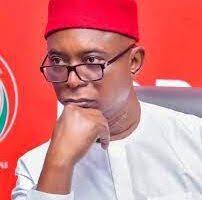
 Opinion9 months ago
Opinion9 months agoAnioma State: A Necessary Proposal Rooted in Strategic Advantage
-
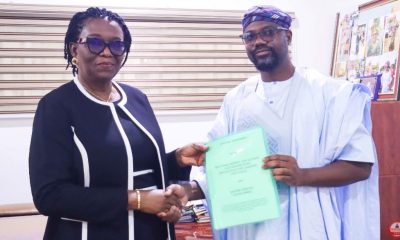
 Business & Economy1 year ago
Business & Economy1 year agoNASENI, Qietur partner to build 3000 Housing Units for Staff
-
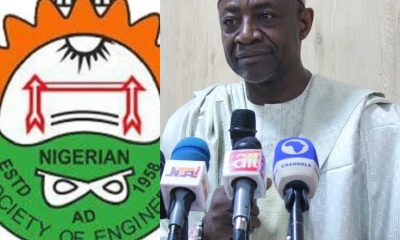
 Business2 months ago
Business2 months agoLithium boom has reshaped Nasarawa’s economy, says Prof Haruna
-
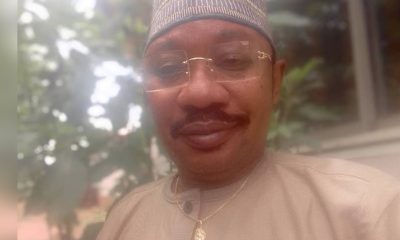
 Law1 year ago
Law1 year agoHuman Right and Law Enforcement in Nigeria: A Critical Analysis
-
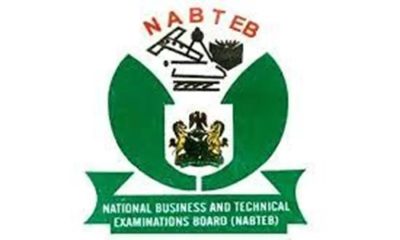
 Education3 months ago
Education3 months agoNABTEB Registrar advises automotive, locomotive Engineers to do more to diversify Nigerian economy
-

 Education6 months ago
Education6 months agoTVET will change Nigeria for good, says NABTEB Registrar
-
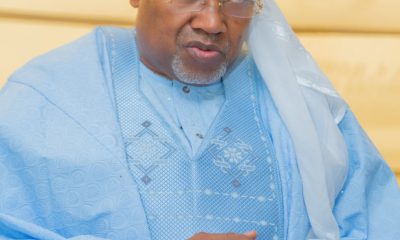
 Opinion3 months ago
Opinion3 months agoEngr. Kawu: A Heroic Homecoming for a Man of the People
-
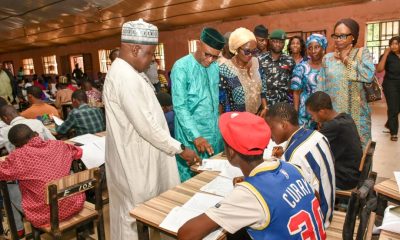
 Education6 months ago
Education6 months agoTVET: FG conducts entrance exam into FTCs for 30,000 students
